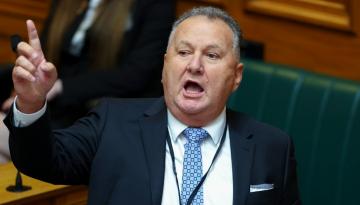The Government wants to double New Zealand's export of minerals in the next 10 years, with a commitment to new mining projects all over the country.
Resources Minister Shane Jones' announcement drew strong positive reaction in the West Coast town of Blackball - but opponents said the proposal will dig a hole for the environment.
There was protest - and counter-protest - as Jones arrived in Blackball on Thursday.
"Today, in Blackball, this is a red-letter day," he told a packed town hall.
"We are turning around that false hood and that attack against our industry and I need your support to do it."
Jones was speaking at the birthplace of the Labour Party.


"I deliberately chose to come to Blackball because we need to re-legitimise [and] reinvigorate mining," the former Labour MP said.
"It's been abandoned by the Labour Party. They are now a metropolitan, identity-driven party that feels embarrassed about those historic roots.
"We need to use the endowments that we've been given, we need to profit from them and stop the catastrophisation that every time you put a shovel, a machine, a digger in the ground - you're destroying the sacredness of earth mother.
"What is the point of being poor in paradise? You'll still be poor," he said.
The new proposal is very much about mining New Zealand, from lithium in Northland to titanium on the West Coast and hydrogen across Otago and Southland.
"It will have relevance to the investments in Coromandel. It will have relevance to the upcoming investments in Otago, and I kind of feel Te Tai Poutini - the [West] Coast - they've had a bum deal," Jones said.
Those sentiments were echoed by West Coast locals who have skin in the game.
"Even after Pike [River Mine explosion] happened I was for it," said Bernie Monk, whose son Michael died in the disaster. "And I'm here to support the workers of the West Coast, and so are the families," Monk told Newshub.
Buller District Mayor Jamie Cleine said he was keen to explore "some sustainable outcomes for the communities [in the] long term as well".
But the minister believes the effects of this proposal could be felt much sooner.
"That could be as timely as six months. That's a figure that the fast-track legislation has," he said. "But look, I hasten to add it's at the Select Committee and I have no doubt that various bits and pieces of that proposed piece of legislation will change through the Select Committee process."
For those who came to hear Jones speak, it can't come soon enough.


